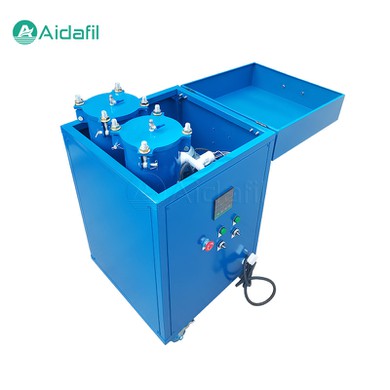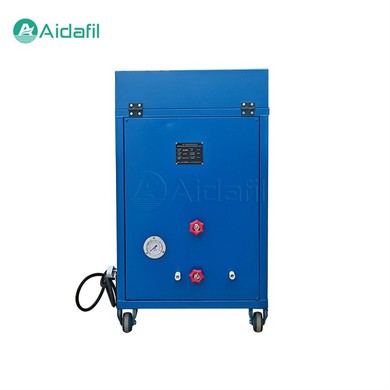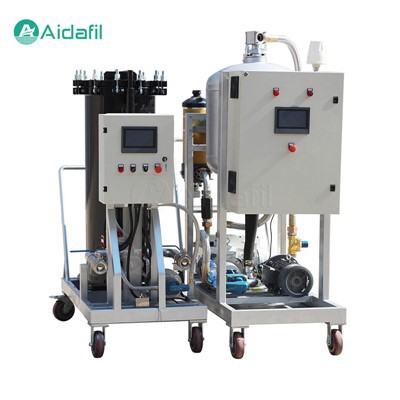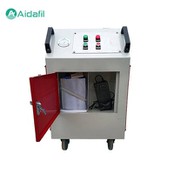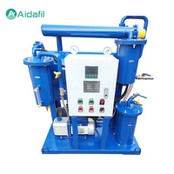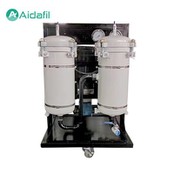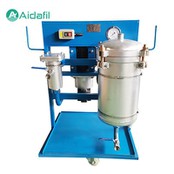
Waste Lube Oil Filtration And Decolorization Machine
Product Details
The waste lube oil filtration and decolorization machine is an efficient piece of equipment designed for the treatment and reuse of used lube oils. Through a series of complex processes, it can deeply purify and decolorize used lube oils that contain various impurities, enabling the oil to approach or meet the standards of new oil, thus realizing resource recycling and environmental protection.
Technical Features and Advantages
1. High efficiency processing capability. The waste lube oil filtration and decolorization machine can process a large amount of waste oil in a short time, and the quality of the treated oil is stable.
2. Advanced decolorization technology. It effectively removes pigments from the oil using a combination of physical and chemical methods, without the need for acid-base decolorization methods, making it environmentally friendly and safe.
3. Energy saving and environmental protection. It reduces dependence on crude oil and lowers environmental pollution, aligning with the concept of sustainable development.
4. Simple operation. With a high degree of automation and a user-friendly interface, the machine is easy to operate and maintain.
5. Significant economic benefits. It extends the life cycle of lubricants and reduces the cost of purchasing new oil, offering good return on investment.
Application Scenarios and Suitability
The waste lube oil filtration and decolorization machine is widely used in industrial production, especially in industries such as steel, cement, power, and chemicals, which generate a large amount of waste lubricants. Effective recycling and treatment of these oils not only help to reduce environmental pollution but also conserve resources.
Additionally, this type of equipment is also suitable for certain special occasions, such as shipyards and machining factories. Although these places do not generate a large amount of waste oil, they still require proper treatment.
Working Principles
The waste lube oil filtration and decolorization machine employs several techniques to achieve efficient purification and decolorization. These processes include:
1. Filtering
The machine uses high-quality filters to remove solid particles, metals, and sludge from the waste lubricating oil. These filters are designed to capture contaminants of varying sizes, ensuring thorough cleaning of the oil.
2. Sedimentation
In this process, the waste oil is allowed to settle, allowing heavier particles and sediments to settle at the bottom. The settled particles are then removed, further improving the oil's purity.
3. Decolorization
The waste oil is subjected to a decolorization process, which involves the use of activated carbon or other decolorizing agents. These agents adsorb impurities and color-causing substances, resulting in the restoration of the oil's original clarity.
4. Dehydration
The machine employs a dehydration process to remove excess water from the waste oil. This is crucial as water can lead to corrosion and degradation of lubricating oils. The removal of water ensures the oil's stability and extends its usable life.
Benefits
1. Environmental Protection
The waste lube oil filtration and decolorization machine plays a vital role in environmental protection by preventing the improper disposal of waste lubricating oils. These oils, when released into the environment, can contaminate soil and water sources, leading to severe ecological consequences. By recycling and reusing these oils, the machine helps to minimize the environmental impact and promotes a circular economy.
2. Resource Conservation
The machine offers a cost-effective solution for industries to conserve valuable resources. By recovering waste lubricating oils, companies can reduce their reliance on fresh oil production, which consumes significant energy and water resources. This conservation not only helps to preserve natural resources but also contributes to reducing greenhouse gas emissions associated with oil extraction and refining processes.
3. Cost Savings
The waste lube oil filtration and decolorization machine provides economic benefits to industries by reducing their lubricating oil consumption costs. By recycling waste oils, companies can save on the expenses related to purchasing new lubricants. Additionally, the machine helps to extend the lifespan of lubricating oils by removing impurities, thereby reducing the frequency of oil changes and maintenance costs.
4. Improved Product Quality
The decolorization process performed by the machine ensures that the recycled lubricating oils meet the required quality standards. The removal of coloration improves the transparency and purity of the oil, ensuring its suitability for various applications. This high-quality recycled oil can be used in machinery, automobiles, and other industries, contributing to enhanced performance and reliability.
The Importance of Lube Oil and Their Environmental Impact
Lube oils play a crucial role in the smooth operation of machinery across diverse sectors, from transportation to manufacturing and energy production. They reduce friction, cool down moving parts, and help prevent wear and tear, thus extending the life of equipment and reducing maintenance costs. However, as lube oils become contaminated with dirt, metal shavings, and other impurities over time, they lose their effectiveness and eventually need to be replaced.
Traditionally, used lube oils have been disposed of in landfills, incinerated, or recycled through simple distillation processes. These methods, however, are not only environmentally unsustainable but also fail to recover the full potential of the used oil. Landfill disposal can lead to groundwater pollution, while incineration releases harmful gases into the atmosphere. Simple recycling often results in low-quality oil that is not suitable for high-performance applications.
FAQ
1. What is an oil purifier, and how does it work?
An oil purifier is a device designed to remove impurities and contaminants from used oil, making it suitable for reuse or safe disposal. It works by passing the oil through various filtering elements, which trap the particles and impurities while allowing clean oil to pass through.
2. What types of oils can be filtered using an oil purifier?
Oil purifiers can be used to filter various types of oils, including the transformer oil, turbine oil, lubricating oil, hydraulic oil.
3. Can I dispose of the filtered oil safely?
Yes, once the oil has been filtered, it can be disposed of safely, provided that it meets the local regulations and guidelines for waste oil disposal. Be sure to check with your local authorities or waste management companies to determine the proper procedures for disposing of filtered oil in your area.
4. Is it cost-effective to invest in an oil purifier?
Investing in an oil purifier can be cost-effective in the long run, as it allows you to reuse filtered oil, reducing the need for frequent oil changes and the associated costs. Moreover, maintaining clean oil helps extend the life of equipment and reduces the likelihood of costly repairs due to premature wear and tear.
Why choose us
· Professional manufacturer with many years' experience
· Good quality with competitive price
· OEM & ODM are welcome
· Various payment items are acceptable
· Good service by experienced manager
Enterprise tenet: Honest first, quality foremost
Operation belief: Establishment of AIDA brand and satisfaction of users are our persistent pursuit.
Service tenet: Responsible for every procedure; responsible for every machine; responsible for every customer.
Hot Tags: waste lube oil filtration and decolorization machine, China, factory, price, buy, oil filter for industry, glass fiber oil separator filter, multi colored air compressor oil filter, Hydraulic Filter Element, Sintered Metal Fiber Felt, rigid structure sintered metal filter cartridge

